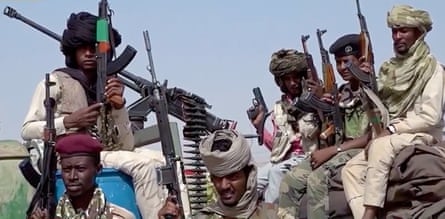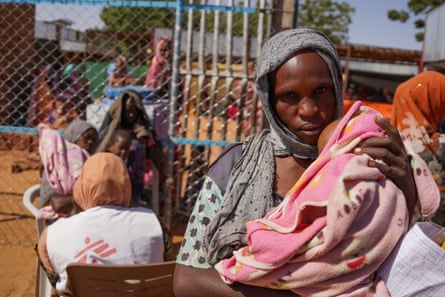Water, food and fuel supplies for people in the largest city in the Darfur region of Sudan are being choked off as fighting intensifies, according to reports.
El Fasher has been encircled by the Rapid Support Forces (RSF) paramilitary group over recent weeks, besieging the population as well as the Sudanese Armed Forces (SAF) and allied militias.
Already hosting many of those displaced from other parts of Darfur that have fallen to the RSF, residents this week said more people have been displaced within the city as the SAF carried out airstrikes.
Salah Adam, who helps support people in the Abu Shouk displacement camps through community-led initiatives known as Emergency Response Rooms, said: “The security situation is getting bad. The clashes on the eastern side have forced some civilians to leave their homes to other areas in the city. All the news from around the city is that it will be attacked, the civilians feel threatened and fearful.”
Adam and many others from El Fasher’s displacement camps are survivors of the genocide carried out in the 2000s by the Janjaweed, the militias that were later formalised by the Sudanese state into the RSF.
According to satellite imagery and open-source reporting by the Humanitarian Research Lab at the Yale School of Public Health, the Sudanese air force has been bombing RSF units that have entered the city, some of them close to a displacement camp hosting more than 80,000 people.

It said the RSF now has control of all main roads into and out of El Fasher. The RSF claimed on Tuesday that it had “repelled” 22 attacks by the military and called in reinforcements.
Footage posted by the activist group Darfur Victims Support, which seemingly confirmed clashes between the RSF and SAF in the city this week, showed a large fire accompanied by the constant sound of shooting.
El Fasher is considered a humanitarian hub for Darfur and hosts a large population of internally displaced people, including hundreds of thousands displaced by ethnic violence in Darfur over the past 20 years.
While the fighting is in its early stages, the siege of El Fasher has contributed to a mounting humanitarian crisis in the city, with limited access to food, water, fuel and medicine, say residents.
The UN refugee agency, UNHCR, said the violence has meant that a number of trucks carrying aid intended for El Fasher have had to halt their journey until they can receive security assurances.
Residents say food has become especially scarce and more expensive over the past two weeks, since the RSF took control of the town of Mellit, north of El Fasher, which is on a key route for supplies from Libya and Chad.
“The city is under siege … the price of food is increasing after RSF took control of Mellit and it’s having a harsh effect on us. I haven’t been able to eat since the morning today,” said Adam.
“People are in dire need of food, medicine and water but we cannot get them. The cost of basic needs are increasing and children are dying of malnutrition.”
He said the city is crowded with internally displaced people, many of them living in schools and displacement camps. The UN reported that 40,000 people were displaced by attacks on villages near El Fasher in the first two weeks of April.
UNHCR said at least 29 civilians were killed by attacks on 16 villages west of El Fasher in mid-April, with multiple incidences of sexual violence, looting, the destruction of homes and businesses, and the theft of livestock.
after newsletter promotion

The medical charity Médecins Sans Frontières (MSF) warned on Tuesday of high levels of malnutrition, saying that of 46,000 children screened at the Zamzam displacement camp, 9 miles (15km) south of El Fasher, 30% were found to be suffering from acute malnutrition.
Claire Nicolet, the head of MSF’s emergency response in Sudan, said: “The lives of hundreds of thousands of people were already in jeopardy – and now, with the current fighting, even more are at risk.
“There is an urgent need for the humanitarian response to be rapidly scaled up so that this malnutrition crisis can be pulled back from the brink. For this to happen, it is vital that the warring parties take action to enable safe humanitarian access and the protection of civilians.”
MSF also noted civilian casualties from the escalated fighting in El Fasher, saying that it had treated more than 100 war-wounded, many of them with bullet injuries, over the past two weeks.
An El Fasher resident, Taj al-Deen, said the lack of fuel getting through to the city may mean water soon runs out, as generators used to pump it will not be able to function.
“El Fasher is living its very worst days since the war started,” he said. “There are many families depending on only one meal a day. RSF are threatening the civilians through hunger and thirst. They are refusing to allow any goods to enter El Fasher; even today I met some of the drivers who came from Mellit to El Fasher. They said they stole all their goods – about 38 vehicles looted for their goods.”
Human rights monitors fear a rise in atrocities if the RSF takes control of El Fasher, which would give it control of all of Darfur’s major cities. The RSF has been targeting members of the Masalit ethnic group across Darfur, including massacres in El Geneina, where the UN believes up to 15,000 people were killed.
Nathaniel Raymond, the executive director of Yale’s Humanitarian Research Lab, said: “The only way that targeted killings, and mass atrocities do not happen is if the RSF behaves the exact opposite of how they have in every other capital they have captured, or they’re stopped.
“Their entire tactical approach has been consistent with acts of genocide until this point, we have to prepare for these crimes.”
Source: theguardian.com


